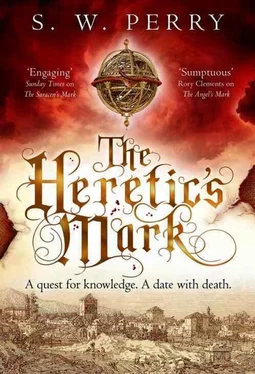Nicholas has a sense of falling – the warning the stomach gives the brain of coming terror. He remembers that old Dr Lopez made a similar journey not so many months ago, and from there to the Tower. As he follows Winter and his boy out of the dank little cell and into the June sunshine the warden’s head does not lift from his ledger, as though Nicholas Shelby has been already condemned and forgotten.

In her apothecary’s shop on Bankside’s Dice Lane, Bianca Merton is preparing an emulsion for Widow Hoby’s inflamed ear. She takes up a bottle of oil of Benjamin and pours a generous measure into a stone mortar, which she sets on a tripod over the stub of a fat tallow candle. Then she breaks up some mint, marjoram and oregano, pares a few leaves of wormwood from a stem and drops the mixture into the gently warming liquid. As she begins to grind the pestle, the scents spill out in profusion. She inhales. She smiles. There might be an open sewer outside, but in her modest premises the air is always exotically fragrant.
Some who live in the teeming warren of lanes that cluster around the Rose playhouse on the south bank of the Thames would think it a shame to pour such a fine oil into the ear of an old woman with barely the clothes on her back to her name, but Bianca knows Widow Hoby has a good soul. Her husband was one of the more than ten thousand Londoners who were carried off by the pestilence that ravaged the city last year. She deserves a little luxury.
On Bankside, indeed throughout Southwark, there is a certain air of mystery – not to say notoriety – about Bianca Merton. For a start, she looks different. Her skin has a healthy caramel sheen to it, a hint (or so her mother always told her) of a family line that ran from the Italian Veneto across the Adriatic to Ragusa, and from there into Egypt, or Ethiopia, or even far Cathay. (Her mother had never been entirely specific on the subject.) But it is more than just her complexion – which admittedly has paled a little under the unpredictable English sun – or her startling amber eyes and the thick, dark convolutions that spill from a high, determined brow that mark her out as exotic. Whether her customers come for oil of bitter almonds to ease a ringing in the ears, a decoction of plantain, sorrel and lettuce for a nosebleed or simply for a chat, they cannot help but wonder if the rumours are really true: that the daughter of an English spice merchant and an Italian mother can mix a poison as deftly as she can a cure.
Being what the rest of London refers to disparagingly as denizens of ‘the Turkish Shore’ and thus used to the unusual, these same Banksiders have long since taken to Bianca Merton. Southwark admires a certain dash, a measure of what it likes to call ‘assurance’. Man or woman, poor or poorer (there are few enough in the city’s southernmost ward who are rich), they don’t much care if it’s not shown by their clothes. A jaunty cap worn at a rakish angle, a flash of bright ribbon, a string of polished oyster shells sewn to the collar in place of pearls will do, if it’s all one can afford. What is important is that you walk down Bermondsey Street or along the riverbank with your chin up, as though the Bishop of London, the queen’s Privy Council, the Lord Mayor and his Corporation – along with all their petty laws – can go straight to the Devil in a night-soil waggon, for all you care. And in this, Bianca Merton suits them down to the ground.
For those who have learned of it, and Bianca has done her utmost to ensure there are few, the only thing that might raise a doubting eyebrow is her faith. In a realm whose present queen is still under a pope’s sentence of excommunication, and whose former sovereign, the bloody Mary, burned three hundred Protestant martyrs before her own departure into a richly deserved hell, Bianca Merton’s Catholicism could well be viewed with suspicion. Not so much now, of course. Not since she purchased the Jackdaw tavern with the money her father had left her. There are few heresies a Banksider won’t forgive, if the price of his ale is competitive. And besides, you’d be hard pressed to find one who doesn’t have something in their larder they’d rather not share with the world across London Bridge.
The one thing they are all agreed upon is that they cannot quite bring themselves to address this comely young woman with the interesting past by her new, married name. She came to them as Mistress Merton, and Mistress Merton is how they see her still, regardless of their happiness at the match. Goodwife Shelby just doesn’t seem to fit.
When the oil infusion is complete, Bianca adds it to the rest of the medicines she has prepared for tomorrow’s early customers. She locks her shop and goes out into the warm summer air. She walks the short distance to the pleasant lodging she and Nicholas rent close to the river by the Paris Garden. On the way she passes the place where her Jackdaw tavern had stood for centuries – until that summer night last year, when the trail of mayhem caused by her new husband’s association with Sir Robert Cecil brought about its incineration and her own close brush with death. Recovering in the splendour of Nonsuch Palace, the home of Nicholas’s friend, John Lumley, she had often wondered how she would feel when she looked again on the ruins of the place she’d bought with her father’s inheritance when she arrived in London from her former life in Padua. She had suspected it would break her heart, despite the fact that Nicholas, after his return from the Barbary shore, had the means to rebuild it. To her surprise, she had dismissed the blackened skeleton with a shrug. New starts, she had realized, were nothing new to her now. They were to be embraced, not feared.
She stops to inspect the work. She observes the freshly hewn oak posts set into the scorched foundations, the frame upon which the new Jackdaw will rise, and checks that the masons have run the first few courses of bricks straight. Not too straight, mind; the Jackdaw was never about symmetry – that had been part of its charm. Announcing her satisfaction to the foreman in charge of the reconstruction, she walks on towards the Paris Garden.
Arriving at the lodging, she finds two notes left for her. The first is from Nicholas himself – their love is still fresh enough to leave each other billets-doux. She reads it, learns that he expects to return from St Tom’s by five and tucks it into the neckline of her gown, where she imagines the feel of it against her skin is instead of the warmth of his touch.
The second note is from Rose Monkton.
Mistress Moonbeam, as Bianca is wont to call her friend and former maid, has returned to Bankside to help her while the Jackdaw is being rebuilt. The note informs her that Rose has gone across the bridge, on an errand to visit an importer of spices on Petty Wales whom Bianca knows to be that rarity amongst Thameside merchants: an honest man. Too many of them these days are not above bulking out their wares with powdered acorns and other counterfeit dusts. This one does regular business with his counterparts in Venice, the middlemen in the trade from the Levant and Asia. It is a useful conduit for Bianca’s letters to her cousin in Padua, Bruno Barrani. All it costs is her continued custom, and free medicine for the merchant’s hermicrania. She checks to see if Rose has taken her latest letter with her, because Rose is liable to forget her own name if the wind changes direction suddenly. She has.
There has been a lot to tell Bruno since last she wrote – most of it impossible to put in a letter. So Bianca had confined herself to a report of daily life on Bankside, and for his greater interest – because Bruno likes to hear of strange phenomena – she had mentioned the mercifully brief fresh outbreak of plague in the spring; the great storm at the end of March that had torn up so many trees and ripped off so many roofs; and the fearful rains and gales of early April. Her final words, before closing with the usual expression of familial devotion and commending Bruno to God’s merciful protection, had touched on the matter closest of all to her heart: as yet, no sign of our hoped-for bounty…
Читать дальше













